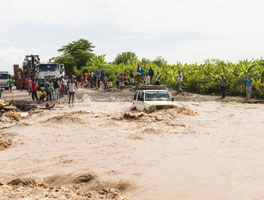 |
Dear readers,
Welcome to the Climate Weekly newsletter by the Centre for Science and Environment’s Climate
Change programme and Down to Earth.
The southern city of Bengaluru is facing an acute water shortage. A weak monsoon last year and increased pumping of groundwater has left the residents of the city grappling with a crisis. CSE’s Director-General Sunita Narain reiterates the need for a complete shift in water management paradigms, cautioning that any Indian city could see a similar fate in the years to come. Over-reliance on high-cost engineering solutions such as transportation of water over hundreds of kilometers in pipelines has brought the city to this position, she writes. Previously full of lakes - holders of excess rainfall - the city’s natural, efficient water management system today stands covered in tarmac - literally. She urges urban planners to once again include prudent sewerage treatment as part of economically viable water planning practices. The need for system-level changes is underscored given the climate-risked times we live in, where rainfall is going to become more extreme and more variable, she highlights.
Meanwhile, over three months have passed since COP28 was held in Dubai, UAE. Among the outcomes from the climate change conference was the call for countries to rapidly reduce their non-carbon dioxide emissions, including methane. A new report from the International Energy Agencyshows that methane emissions from fossil fuel use in 2023 were close to being the highest ever at 120 million tonnes. The USA topped the list of emitters of this potent greenhouse gas. Methane is responsible for about 30% of the rise in global temperatures since pre-industrial times. Rohini Krishnamurthy from Down to Earth highlights the report’s key findings and gives insights into the state of methane emission reductions among top oil and gas producers.
The link between climate change and the food we eat has also been explored this week in CSE’s newly launched book, ‘The Future of Taste.’ It covers the environmental impacts of food production systems and the need for climate-resilient food choices and includes some recipes too.
Lastly, you can sign up for the residential training program, ‘Clean Build: Pathways to Decarbonize the Built Environment’ here.
|
|
 |
| |
 |
|
| |
 |
 |
| |
By - Sehr Raheja
Climate Change, CSE
|
| |
|
 |
|
|
| |
 |
|
| |
| EXTREME WEATHER TRACKER |
| |
|
East Africa must prepare for more extreme rainfall during the short rainy season — new study, 12 March 2024 |
 |
 |
|
|
| |
In the long term it is crucial to ensure that any new infrastructure is robust to withstand more frequent and heavier rains |
|
| |
|
|
| |
 |
|
| |
|
|
| |
|
|
| |
|
Bengaluru today, your city tomorrow
|
 |
|
India’ third-most populous urban area is just another city that is being shown the mirror—the dreams of a perfect water supply driven by high-cost engineering solutions are being shattered
|
|
|
| |
 |
|
| |
CLIMATE NEWS | SCIENCE| IMPACTS| POLITICS |
|
| |
 |
|
| |
|
|
| |
 |
|
| |
|
|
| |
 |
|
| |
|
|
| |
 |
|
| |
|
|
| |
 |
|
| |
|
|
| |
 |
|
| |
|
|
| |
 |
|
| |
|
|
| |
 |
|
| |
|
|
| |
 |
|
| |
|
|
| |
 |
|
| |
|
|
| |
 |
|
| |
|
|
| |
 |
|
| |
|
|
| |
 |
|
| |
|
|
| |
|
|
| |
| Onsite Training Course |
|
Book |
| |
|
|
|
|
|
|
|
|
| |
|
|